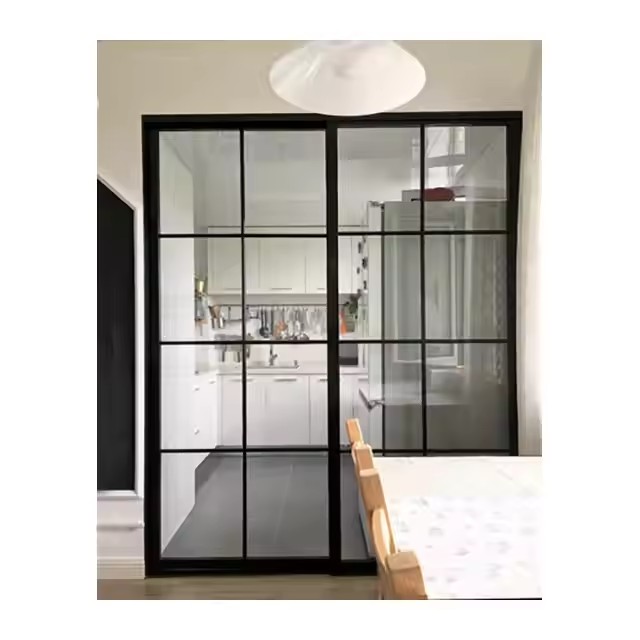Product Strategies
Precise Market Positioning
Before entering overseas markets, it is essential to conduct in-depth research on the demand characteristics of target markets. For example:
The European and American markets may prioritize the environmental performance, intelligence, and minimalist fashion design of folding doors.
The Middle East market, due to its hot climate, may have high requirements for the heat insulation and sun protection functions of folding doors.
The Southeast Asian market may focus more on product cost-effectiveness.
According to the needs of different markets, position products precisely. For instance, launch high-end smart eco-friendly folding doors for Europe and America, and economical and practical folding doors for Southeast Asia. Accurate positioning in any market is crucial because it helps understand market conditions, enable precise advertising placement, and reach the corresponding target audience effectively.
Promote Product Innovation
Increase R&D investment to continuously launch innovative products:

Develop new materials, such as high-strength, lightweight, and environmentally friendly composite materials, to enhance the performance and quality of folding doors.
Integrate IoT technology to develop smart folding doors that support functions like remote control and automatic induction switching, meeting consumers’ needs for smart home systems.
Innovate in the design of folding doors by incorporating local cultural elements to make them more regionally distinctive and appealing. Innovation serves as a key foundation for Chinese doors and windows to enter the global market.
Improve Product Certification
Actively obtain international authoritative certifications, such as the EU’s CE certification and the US’s UL certification. These certifications serve as “passports” for products to enter international markets, enhancing product credibility and market competitiveness. Meanwhile, ensure that products comply with relevant standards and regulations in target markets, such as building safety standards and environmental protection standards, to avoid trade barriers caused by non-compliance. As different countries require different certifications, improving certification systems to make products comply with more institutional standards and gain recognition will enhance the credibility and influence of door and window brands, thereby attracting more consumers to purchase them.
Brand Strategies
Shape Brand Image
Clarify brand positioning and core values, such as emphasizing product high quality, innovative design, or excellent service. Establish a distinct and unique brand image in international markets through a unified brand visual identity, including logos, packaging, and promotional materials. Actively carry out brand promotion activities, such as participating in international home furnishing exhibitions and holding product launches, to enhance brand awareness.
Tell Brand Stories
Against the backdrop of Chinese traditional culture, combine the company’s development history and product characteristics to tell brand stories. For example, highlight that the craftsmanship of Chinese folding doors inherits thousands of years of woodworking techniques while integrating modern technology, showcasing the brand’s historical heritage and innovative spirit, and enhancing its cultural connotation and appeal.
Carry Out Brand Collaborations
Collaborate with internationally renowned home furnishing brands, designers, or institutions. Through co-branded designs and joint promotions, leverage their brand influence and resources to enhance your own brand’s visibility and reputation. For example, collaborating with internationally renowned designers to launch limited-edition folding door series can attract the attention of high-end consumers.

Channel Strategies
Expand Traditional Channels
Establish long-term and stable cooperative relationships with distributors and agents in target markets, and use their sales networks and channel resources to quickly introduce products to the market. Participate in international home building materials exhibitions, such as the Cologne International Furniture Fair in Germany and the Las Vegas International Building Materials Exhibition in the United States, to display products and connect with potential customers and partners. Additionally, collaborate with local builders and decoration companies to sell folding doors through project channels.
Develop E-Commerce Channels
Build cross-border e-commerce platforms, such as opening official flagship stores on renowned e-commerce platforms like Alibaba International and Amazon, to directly sell products to global consumers. Utilize social media platforms for e-commerce marketing, such as showcasing products on Facebook and Instagram to attract consumers. Strengthen e-commerce operational capabilities, including optimizing product pages, improving logistics and distribution efficiency, and enhancing after-sales services, to enhance the consumer shopping experience.
Build Overseas Warehouses
Establish overseas warehouses in target markets to store products locally in advance. When orders are received, products can be directly shipped from overseas warehouses, significantly reducing delivery times and improving customer satisfaction. Meanwhile, overseas warehouses can also serve as product display and experience centers, facilitating local customers to visit and experience products, thereby boosting sales.
Marketing and Service Strategies
Formulate Marketing and Promotion Strategies
Develop targeted marketing and promotion strategies based on the characteristics of target markets and consumers’ purchasing habits. In advertising, use traditional media such as television, newspapers, and magazines, as well as new media such as online ads and social media ads, for promotion. Carry out promotional activities such as discounts and buy-one-get-one-free offers to attract consumers. Additionally, leverage word-of-mouth marketing to enhance product visibility and reputation through customer reviews and recommendations.
Provide Localized Services
Establish localized after-sales service teams to provide customers with timely and efficient after-sales support, including product installation, maintenance, and repair services, to ensure that issues encountered by customers during use are resolved promptly. Meanwhile, understand local culture and language to provide localized service experiences, enhancing customer satisfaction and loyalty.

